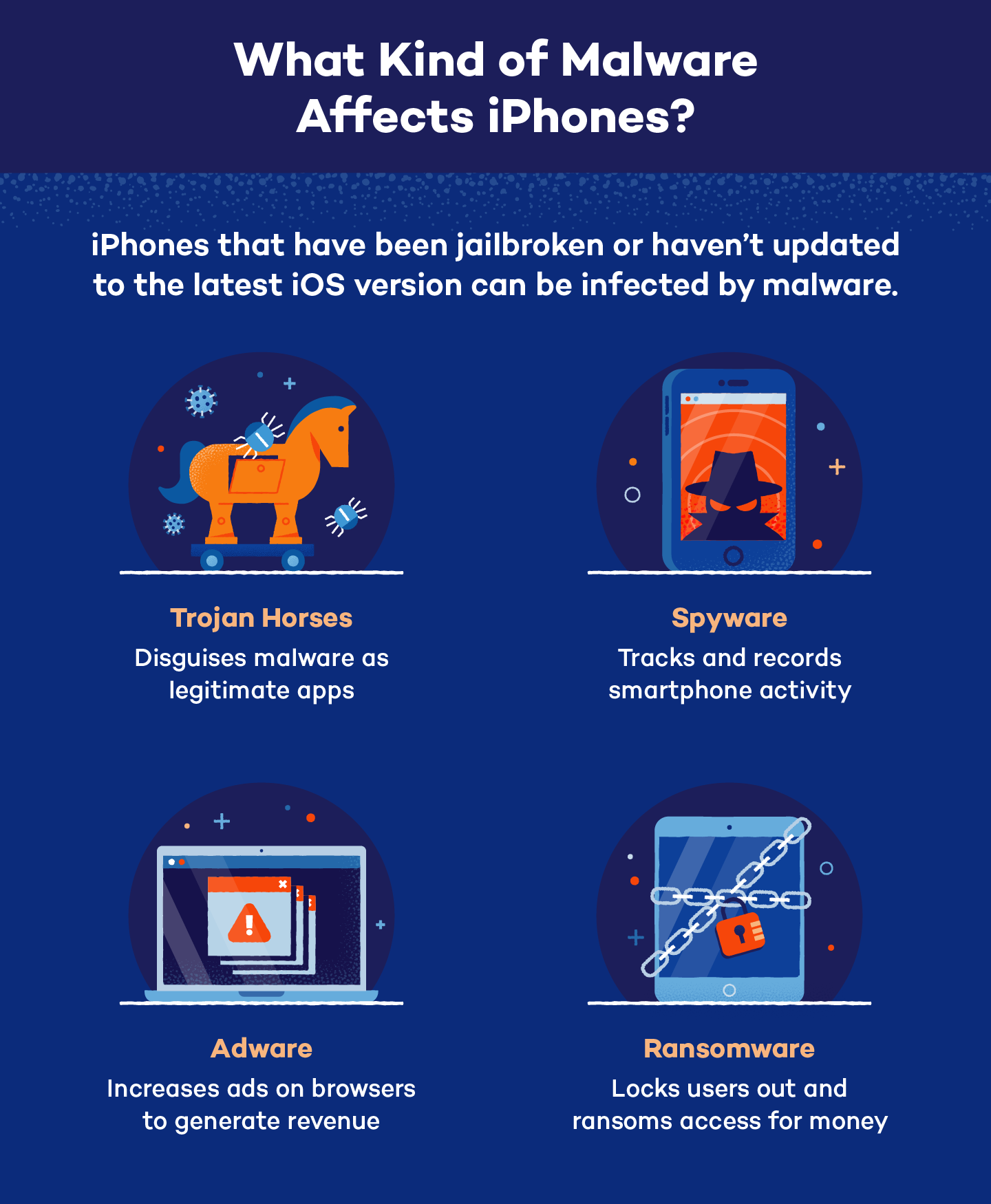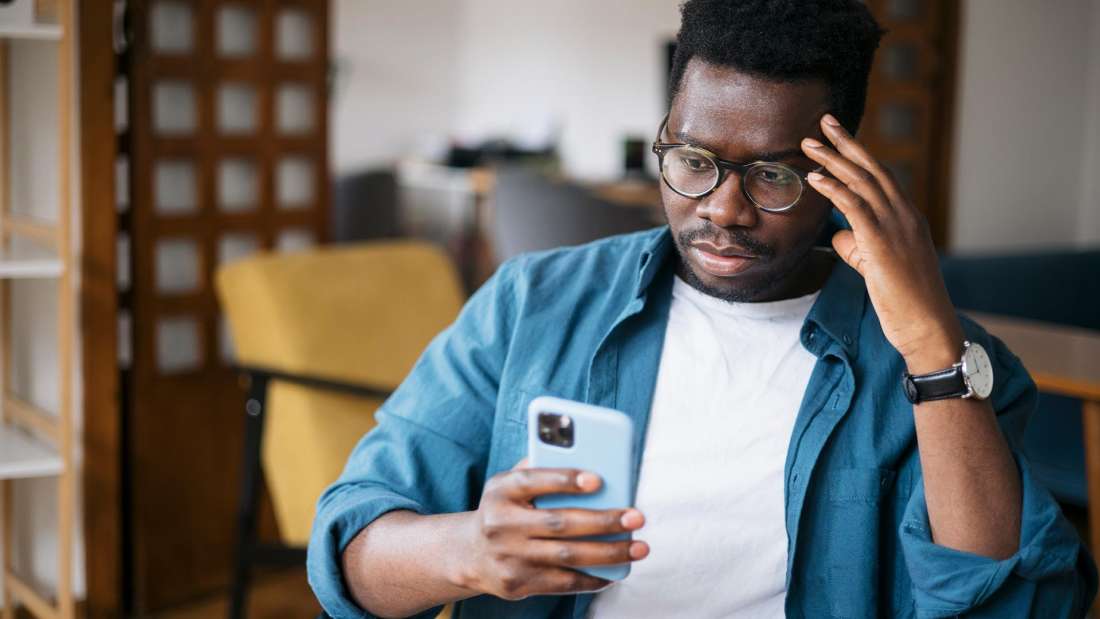Do iPhones need antivirus software? This is a common question among iPhone users, and if you’re not careful, you may run into some common myths. While Apple product security is solid, iPhones can still be susceptible to threats from hackers.
Apple’s operating system (iOS) provides iPhones and other Apple devices with security features that make it extremely difficult for malware to infiltrate. However, if the phone has been tampered with, it may be worth taking additional security measures to protect your devices, such as installing antivirus software.
Our phones house important and sensitive information, which is why it’s crucial to keep your iPhone protected. Keep reading to learn more about iPhone viruses, how to tell if your phone has a virus and precautions to help keep you safe.
Can iPhones Get Viruses?
Yes. Like any computer or smartphone, an iPhone can catch a virus. Viruses work by infiltrating systems, attaching to programs, replicating themselves and attaching those copies to further programs. This allows them to communicate, steal data and cause damage.
While Apple’s built-in iPhone virus protection is strong, iPhones can still be vulnerable when they’re jailbroken. Jailbreaking is when someone bypasses the restrictions of the Apple operating system to have more control over their device. People often do this to install additional apps and programs that iPhones typically can’t run.
Apple’s security is so safe because it uses high-quality encryption, which means iPhones can only work with specific apps. Once an iPhone goes through the jailbreaking process, it no longer benefits from the free iPhone antivirus protection that comes with the phone.
What Viruses and Other Threats Affect iPhones?
A virus is just one type of malware that can be found on an iPhone. There are many types of iPhone viruses and other cyberthreats that could affect your device if it has weakened security, including:
- Ransomware: Ransomware is a type of malware that blocks a user’s access to their device unless they pay a ransom. In some cases, hackers threaten to publish the user’s private information as a way to coerce money from the victim.
- Phishing: This is the act of sending fraudulent messages with suspicious links in ads, messages, calls, voicemails, emails or websites to users with the intent of stealing their identity or other personal information.
- Spyware: These programs record a user’s actions, such as calls, texts, locations, images, video, keystrokes and browsing history, to obtain sensitive information.
- Adware: Adware causes incessant pop-up ads while using a browser, generating revenue for developers every time a user interacts with it.
- Trojans: These nefarious programs are disguised as innocent apps that deploy malware onto devices once downloaded.

How to Detect Viruses on iPhones: 5 Warning Signs
Viruses often remain unseen and undetectable, making it difficult to remove them. Many users may not even be aware that there is a virus on their iPhone.
However, there are several red flags that can indicate an iPhone has a virus, including:
- Overheating: Malware can cause undetectable apps, widgets or programs to continuously run in the background, causing the processor to run heavily, overheat and possibly shut down. If your iPhone starts showing a red thermometer, it may be a sign of a virus.
- Excessive data usage: Similar to overheating, malware running programs in the background may also use data to stay connected to outside networks.
- Pop-ups: If pop-up ads appear while browsing on Safari warning of a virus infection, it’s not an official Apple notification — Apple does not use pop-ups for system warnings, and interacting with the ad can lead to further contamination.
- Unknown or suspicious apps: Apps that appear on iPhones that you haven’t downloaded or that didn’t come preinstalled may have been downloaded by cybercriminals.
- Drained battery life: Like overheating and data use, malware that causes background programs to run can use up power and drain batteries.
Of course, these signs do not always mean that an iPhone is infected. They may instead indicate that the phone is simply outdated, broken or old. However, because an iPhone virus scan tool is not preinstalled, the root of these issues can be difficult to determine. The most effective way to take care of your device is to be proactive with safety measures.
6 Ways to Protect Your iPhone From Viruses
For those looking to take the extra step in protecting their smartphone against viruses, malware and other digital attacks, consider:
- Updating your software: Enabling automatic iOS updates will help keep your phone’s security software up-to-date and prepared to fend off the latest types of malware attacks.
- Setting up a password manager: Password managers provide additional layers of protection for passwords, including enhanced encryption, password organization and password generation.
- Enabling touch or face ID: Similar to using password managers or two-factor authentication, using touch or face IDs makes it difficult for hackers to enter accounts without physically being present.
- Using a VPN: Many iPhones have automatic Wi-Fi connection settings enabled, making a VPN a key tool in protecting your location and data while browsing the internet with your smartphone. This is especially helpful if you regularly use public Wi-Fi.
- Turning on USB protection permissions: USB permissions protect phones that are plugged into public chargers from being “juice jacked,” or having malware installed while it’s being charged so that the system can be accessed remotely.
You can turn on USB restrictions by going to “Settings” > “Face ID & Passcode” > scroll to the “Allow Access When Locked” section and toggle “Accessories” to the off position.
- Installing antivirus software: Almost any electronic device can be attacked by malware. Installing antivirus software for iPhones can improve security and lower the risk of one device infecting others if they’re jailbroken.
How to Protect Your iPhone and Your Information From Hackers
Despite Apple’s best efforts, jailbroken phones allow hackers to find ways around its safety and privacy technology. And although you may not need it now, it is possible that there will soon be a time when you question whether your iPhone needs antivirus support to stay secure.
Of course, smartphones are not the only Apple products at risk. It’s important to remember to also protect Mac desktops from viruses with effective software. Ensure your entire digital landscape is protected with a Panda Dome Premium antivirus service plan today.
iPhone Antivirus FAQ
So, do iPhones need antivirus protection? If you still have questions about iPhone security, check out the answers to common questions below.
Can iPhones Get Hacked?
iPhones can get hacked just like any other mobile device. While Apple devices are generally much more secure than their Android counterparts, it’s still possible for iPhones to fall victim to cyberattacks. Keep your iOS updated and follow the other protection tips above for optimal device safety.
Does My iPhone Need an Antivirus if It’s Not Jailbroken?
No, non-jailbroken iPhones don’t need third-party antivirus software. Apple’s iOS has built-in security features that isolate apps and prevent malware from accessing system resources.
Does Apple Have a Built-In iPhone Antivirus App?
While not labeled as an “antivirus,” iOS has comprehensive security protections built into the operating system. These include app sandboxing, automatic security updates and a closed ecosystem that verifies all apps through App Store review.
How Do I Run a Security Check on My iPhone?
Go to Settings > Privacy & Security and click “Safety Check.” Keep your iOS updated and regularly review which apps have access to your location, camera and microphone.
